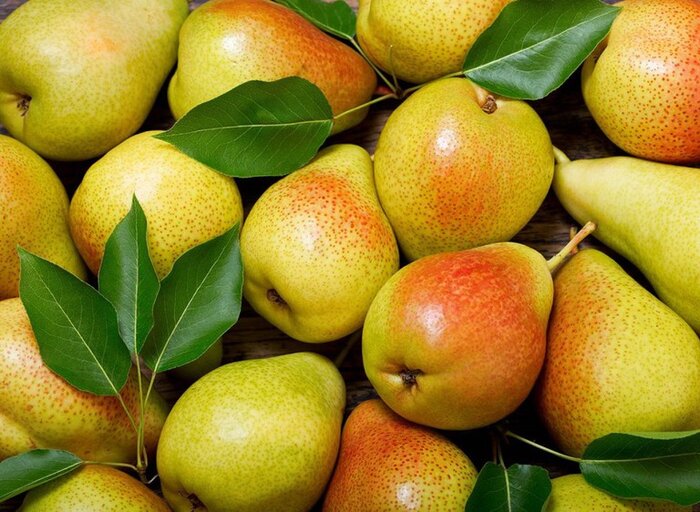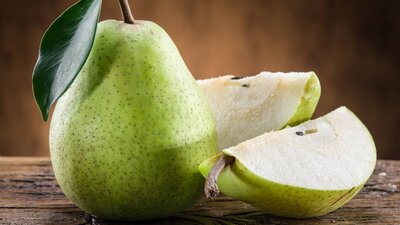Pear Nutrition: Understanding the Facts About Calories, Protein, Fat, Carbs, and Vitamins
Pears are a delicious and nutritious fruit that is enjoyed all over the world. Not only are they tasty, but they also have a variety of health benefits that make them a great addition to any diet. In this article, we will explore the nutrition facts of pears, including their calories, protein, fat, carbs, and vitamins.
What is Pears

Pears are a type of fruit that belong to the Rosaceae family, which also includes apples and peaches. They are typically round or pear-shaped with a thin, edible skin that ranges in color from green to yellow to red. The flesh of a pear is juicy and sweet, with a grainy texture. Pears are a good source of dietary fiber, vitamins, and minerals, and are commonly eaten fresh or used in cooking and baking. They are a versatile fruit that can be enjoyed on their own, added to salads or smoothies, or used to make jams, sauces, and desserts.
Nutritional Value Of Pears Fruit
How Many Calories Are In Pears
Pears are low in calories, making them a great snack for anyone trying to lose weight or maintain a healthy weight. A medium-sized pear contains only about 100 calories, making it a great option for a midday snack or dessert.
Protein In Pears
While pears are not a significant source of protein, they do contain small amounts of this essential nutrient. A medium-sized pear contains about 0.6 grams of protein, which is not a lot but can contribute to a balanced diet.
Do Pears Have Fat In Them?
Pears are very low in fat, with a medium-sized pear containing only about 0.2 grams of fat. This makes them a great option for anyone trying to reduce their fat intake or maintain a healthy diet.
Carbs In Pears

Pears are a good source of carbohydrates, providing about 27 grams of carbs in a medium-sized pear. However, most of these carbs come from natural sugars, so they are a healthier option than processed foods with added sugars.
Vitamins In Pears Fruit
Pears are rich in a variety of vitamins, including vitamin C, vitamin K, and potassium. Vitamin C is an important antioxidant that helps to protect the body from damage caused by free radicals. Vitamin K is important for blood clotting, while potassium helps to regulate blood pressure and maintain healthy muscles.
Health Benefits of Pears
Are Pears Good For Your Digestive System
Pears are a great source of fiber, which is important for digestive health. Fiber helps to regulate bowel movements, preventing constipation and promoting regularity.
Pears Heart Health
The fiber in pears can also help to reduce cholesterol levels, which is important for heart health. Pears are also rich in potassium, which can help to regulate blood pressure and reduce the risk of heart disease.
Are Pears Anti Inflammatory
Pears contain anti-inflammatory compounds, which can help to reduce inflammation throughout the body. This can help to reduce the risk of chronic diseases like arthritis, heart disease, and cancer.
Are Pears Good For Weight Loss?
As mentioned earlier, pears are low in calories and high in fiber, making them a great snack for anyone trying to lose weight or maintain a healthy weight.
Are Pears Good For Your Diet - How to Incorporate Pears into Your Diet
Pears are a versatile fruit that can be enjoyed in a variety of ways. Here are a few ideas for incorporating pears into your diet:
- Add sliced pears to your morning oatmeal or yogurt for a sweet and nutritious breakfast.
- Enjoy a sliced pear as a midday snack.
- Add diced pears to a salad for a sweet and refreshing twist.
- Bake sliced pears with cinnamon and honey for a healthy dessert option.
Are Pears Good For You
Yes, pears are good for you! Pears are a nutritious fruit that is low in calories, high in fiber, and rich in vitamins and minerals like vitamin C, vitamin K, and potassium. They can promote digestive health, support heart health, and may have anti-inflammatory properties. So, incorporating pears into your diet can be a great way to add some extra nutrition to your meals and snacks. Whether you enjoy them as a snack, a dessert, or as part of a meal, pears are a great way to add a little extra nutrition to your diet.